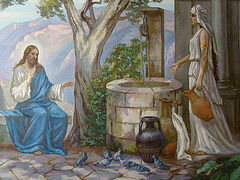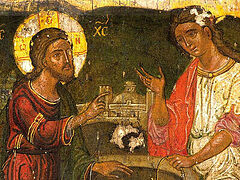In the name of the Father, and of the Son, and of the Holy Spirit. Amen.
Christ is Risen!
We heard today in the Gospel of St. John, a rather long story that has a very deep theological content, of the encounter at Jacob’s Well between our Lord Jesus Christ and the woman from Samaria.
We do not know the name of this woman, but we do know that the Jews and Samaritans did not communicate between each other; they did not see each other as their own; they did not see the humanity of each other in their separate peoples.
Among all the other things we may say about this particular story, it is this aspect I would like dwell on—“the other.” What does this mean for us?
Jesus Christ reaches out to the other, the Samaritan Woman, and He knows everything about her; He accepts her and she realizes that in Him is the true, living Son of God before Whom every human being is to worship. This invites us to look at our own relationship with the other.
Often, we meet people who are complete strangers to us—strangers to us, but not to God. God has no strangers. For every human being is made in the image of God. Every human being has the Divine spark within him. Every human being has the ability to be part of God, because God is more than a part of him—He is fully with him, even if he doesn’t realize it.
“Come and see a Man Who told me everything about myself,” (cf. Jn. 4:29) says the Samaritan Woman to her own people. Only God knows everything that is within us. We cannot know everything about another person. It is impossible. No philosopher, no psychoanalyst, no psychologist can ever reach the depths of human nature. Only God can do that because God Himself became man, became one of us.
We do not know the birth name of the Samaritan Woman, but there is a tradition that her name was in fact Photini. In Russian, it’s Svetlana; in French—Clara; in English—Claire; and even in Celtic languages—Fiona, that is, “light.” She herself had encountered the Light, and she then realized that she bore upon herself the responsibility of being a vessel for this Light, a shelter and vessel for the Light of God Who comes into the world.
God is incarnate, and this aspect of His incarnation means that we have to recognize, know, and venerate God within each of us. And yet how far we are from this. Instead of reverence, we find disdain; instead of courteousness, we find rudeness; instead of love, we find hatred; and alas, in our sad days, instead of peace, we find war.
So let us take an example from this particular encounter. God in the Person of Jesus Christ encounters the Samaritan Woman and in a certain sense all of the human race, for Christ the Logos is the deep structure of the created world. He knows everything about her, and by extension everything about us. We cannot know everything about God, and less so about each other. But strive we must. We should seek out the Divine in the human, and only then can we make up the single Body of Christ that God calls us to be, that is to say, His Church, the formation of which we will soon celebrate on the feast of Pentecost, a few weeks from now. Amen.
Christ Risen!




